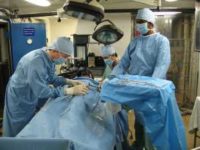MedicalResearch.com Interview with:
Susanna C. Larsson, PhD
Associate Professor, Karolinska Institutet,
Institute of Environmental Medicine,
Stockholm, Sweden
MedicalResearch.com: What is the background for this study?
Response: The causes of Alzheimer’s disease are largely unknown and there are currently no medical treatments that can halt or reverse its effects. This has led to growing interest in identifying risk factors for Alzheimer’s that are amenable to modification. Several observational studies have found that education and various lifestyle and vascular risk factors are associated with the risk of Alzheimer’s disease, but whether these factors actually cause Alzheimer’s is unclear.
We used a genetic epidemiologic method known as ‘Mendelian randomization’. This method involves the use of genes with an impact on the modifiable risk factor – for example, genes linked to education or intelligence – and assessing whether these genes are also associated with the disease. If a gene with an impact on the modifiable risk factor is also associated with the disease, then this provides strong evidence that the risk factor is a cause of the disease.
MedicalResearch.com: What are the main findings?
Response: Our results, based on aggregated genetic data from 17 000 Alzheimer’s disease patients and 37 000 healthy controls, revealed that genetic variants that predict higher education were clearly associated with a reduced risk of Alzheimer’s disease. A possible explanation for this link is ‘cognitive reserve’, which refers to the ability to recruit and use alternative brain networks or structures not normally used to compensate for brain ageing. Previous research has shown that high education increases this reserve.
We found suggestive evidence for possible associations of intelligence, circulating vitamin D, coffee consumption, and smoking with risk of Alzheimer’s disease. There was no evidence for a causal link with other modifiable factors, such as vascular risk factors.
(more…)
 Dr Sian Taylor-Phillips MPhys, PhD
Associate Professor Screening and Test Evaluation /
NIHR Career Development Fellow
Division of Health Sciences
Warwick Medical School
University of Warwick Coventry
MedicalResearch.com: What is the background for this study? What are the main findings?
Response: In newborn blood spot screening a small amount of blood is taken from newborn babies heels, and this is tested for a range of rare diseases. The idea is to detect each disease earlier when it is more treatable. However, it would be better not to test for some diseases, for example if the test is inaccurate so worries parents that their baby may have a serious illness when they do not. Some countries test for as few as 5 diseases and others as many as 50. In this study we investigated how different countries choose which diseases to test for.
We found that many national recommendations on whether to screen newborn babies for rare diseases do not assess the evidence on the key benefits and harms of screening. Evidence about the accuracy of the test was not considered in 42% of recommendations, evidence about whether early detection at screening has health benefits was not consulted in 30% of recommendations, and evidence around the potential harm of overdiagnosis where babies have variants of the disease that would never have caused any symptoms or ill effects was not considered in 76% of recommendations.
We also found through meta-analysis that when a systematic review was used to bring together the evidence then countries were less likely to recommend screening for the disease.
(more…)
Dr Sian Taylor-Phillips MPhys, PhD
Associate Professor Screening and Test Evaluation /
NIHR Career Development Fellow
Division of Health Sciences
Warwick Medical School
University of Warwick Coventry
MedicalResearch.com: What is the background for this study? What are the main findings?
Response: In newborn blood spot screening a small amount of blood is taken from newborn babies heels, and this is tested for a range of rare diseases. The idea is to detect each disease earlier when it is more treatable. However, it would be better not to test for some diseases, for example if the test is inaccurate so worries parents that their baby may have a serious illness when they do not. Some countries test for as few as 5 diseases and others as many as 50. In this study we investigated how different countries choose which diseases to test for.
We found that many national recommendations on whether to screen newborn babies for rare diseases do not assess the evidence on the key benefits and harms of screening. Evidence about the accuracy of the test was not considered in 42% of recommendations, evidence about whether early detection at screening has health benefits was not consulted in 30% of recommendations, and evidence around the potential harm of overdiagnosis where babies have variants of the disease that would never have caused any symptoms or ill effects was not considered in 76% of recommendations.
We also found through meta-analysis that when a systematic review was used to bring together the evidence then countries were less likely to recommend screening for the disease.
(more…)







